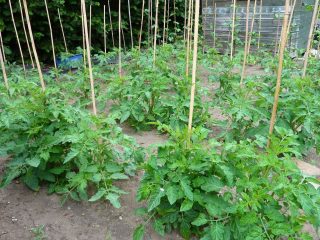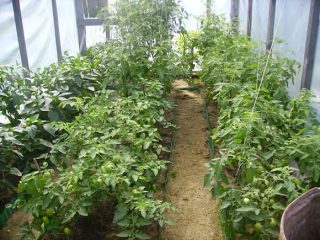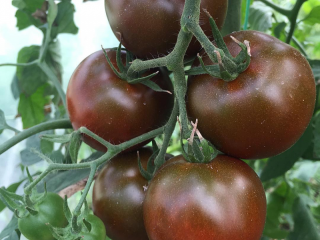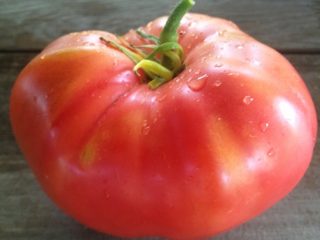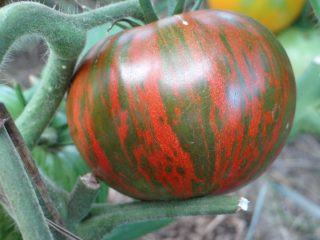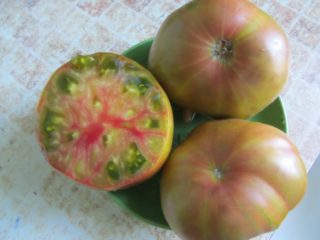Content
The striped pepper tomato is a vegetable crop recommended for greenhouse cultivation. The variety has an interesting shape and color and can be used for preservation and added to various dishes. It is not difficult to care for; thanks to its good immunity, it practically does not get sick.
History of selection
The Striped Pepper tomato is the result of cross-pollination of yellow and red varieties. It appeared on the basis of the Russian agricultural company Agros. He received his place in the State Register in 2009.
Description and characteristics of the tomato variety Pepper-shaped striped
The Striped Pepper tomato is a mid-season variety. It has a fairly compact bush, which is distinguished by its density. When grown outdoors, its height varies from 70 to 95 cm. When planted in a greenhouse, it can reach 1.2 m.
The stems are moderately covered with green colored leaves. They have a slightly elongated shape and jagged edges.About 5-6 clusters are formed on one plant. From six to nine tomatoes are formed on them.

It is recommended to form the striped pepper tomato bush into two stems
The fruits are pepper-shaped, elongated. Their length reaches 15 cm. They are not too large. On average, weight varies from 80 to 120 g. Tomatoes are colored red. Orange stripes run across the entire surface of the fruit. The peel is tough and quite thick. The surface is smooth. In bright sunshine, the skin has a pearlescent sheen.
Each fruit is unique and different from the other. This is possible due to uneven coloring. Some fruits are more red, others more orange. Everyone's stripes have different lengths and widths.
The tomato pulp has a rich red hue. It is quite dense, with a high content of dry matter. It contains hard white fibers. When cut, the seed chambers are visible. There are four of them, they are quite deep. Small seeds are formed in them.

Tomato pulp has a sweet and sour taste. The smell is weak, practically absent
Ripening time
The striped pepper tomato is a mid-season variety. On average, about 115 days pass from planting to full maturity. The fruits ripen almost simultaneously. You can start harvesting as early as mid-August. In bad weather conditions, ripening occurs later. On average, the fruiting period lasts about 21 days.
Tomato yield
This variety of tomato has average yields. Under favorable conditions, up to 2 kg can be collected from one bush. From 1 m2 beds get up to 9 kg.In this case, the planting density is four plants per 1 m2.
Resistance to adverse factors
Tomato variety Pepper striped does not tolerate temperature changes. Fruits develop more slowly. The variety copes well with frequent rains. When there is drought, voids form inside the tomatoes. In addition, the skin may crack.
Where is it grown?
The variety is recommended for cultivation in the central and middle zone. It is not recommended to be planted in the southern regions, since it prefers humid rather than dry climates.
Methods of application
The Striped Pepper tomato has a universal use. It can be consumed fresh, made into juice, or added to winter preparations. The tomato is suitable for canning. Due to its size, it can be sealed in jars as a whole.
Advantages and disadvantages
Collected seeds are not suitable for sowing. They do not retain varietal characteristics.

The variety is recommended to be grown only in greenhouses
Advantages:
- decorative appearance of fruits;
- uniform ripening;
- excellent taste;
- versatility;
- long-term storage;
- tolerates transportation well.
Flaws:
- average yield level;
- peel hardness;
- the seeds are unsuitable for propagation.
Landing dates and rules
It is recommended to grow tomatoes of the Striped Pepper variety using the seedling method. Seeds should be planted in late winter or early spring. Planting process:
- Prepare containers and fill them with soil.
- Make small grooves. Their depth should be 1 cm.
- Place seeds in them and sprinkle with soil.
- Moisten the plantings. Cover the containers with film until germination.
After three good leaves appear, the seedlings need to be planted. It must be transferred to open ground after at least two months. As a rule, this is mid to late May.
Transplant process:
- Dig holes. They should be larger than the root system. Place humus on the bottom.
- Plant the seedlings and compact the soil well.
How to properly care
Pepper striped tomatoes are easy to care for. They need regular watering. This should be done as the top layer dries. It is important to ensure that there is no stagnation of water, but that the soil does not turn into stone. After each watering, it is recommended to loosen the soil and remove weeds. The tool should not be deeply buried in the ground so as not to damage the root system. It is located close to the surface.
Tomatoes respond well to organic fertilizers. During the period of flowering and formation of ovaries, it is recommended to use phosphorus fertilizers. When the fruits ripen, you should pay attention to potassium-based fertilizers. All fertilizing must be stopped at least 14 days before harvest.
Disease and pest control
The Pepper Striped tomato variety has excellent immunity. When grown indoors, plants do not get sick at all.
If they grow outside in cold summers with frequent rains, then late blight is possible. If there are symptoms of damage, it is necessary to spray the bushes with HOM.

After planting, you can carry out preventive treatment with a solution of copper sulfate.
Among pests, whiteflies are the most dangerous. When they appear, it is worth treating the bushes with Commander.

When the fruits ripen, the bushes look very decorative
Conclusion
The striped pepper tomato is characterized by excellent storage; it can be transported over long distances without losing its presentation. For better growth and higher yields, plants are recommended to be pinched and tied to a support. As the latter, various devices can be used.
Reviews from gardeners about the striped pepper tomato






